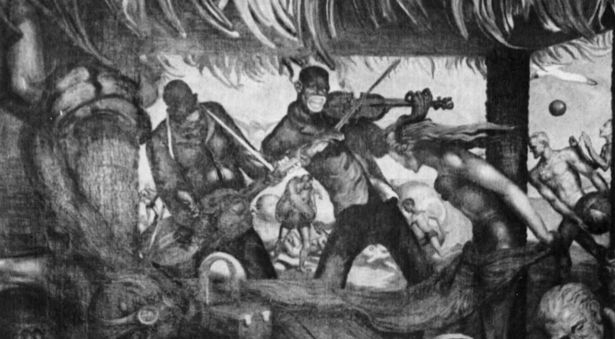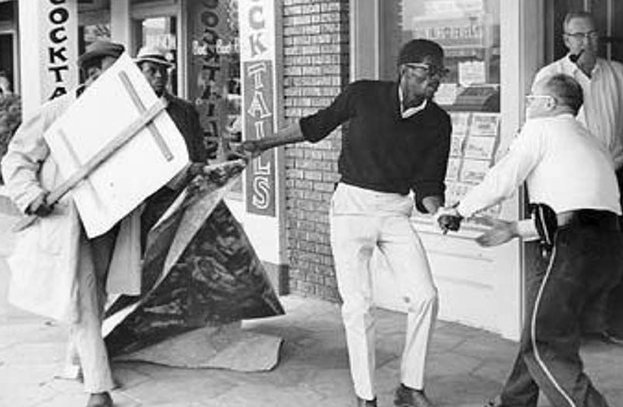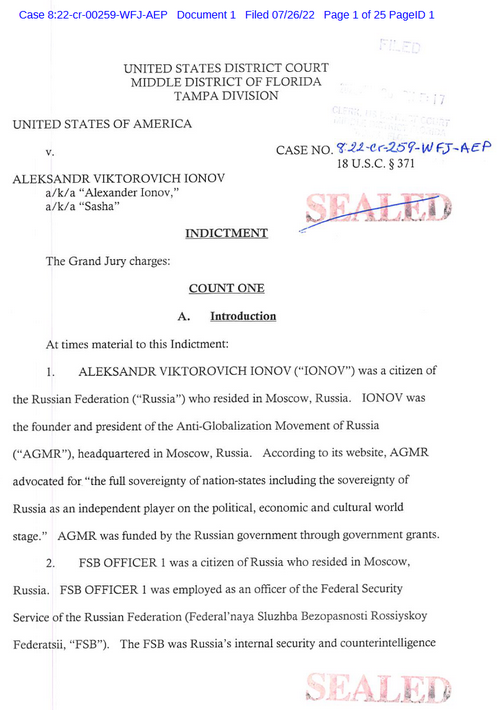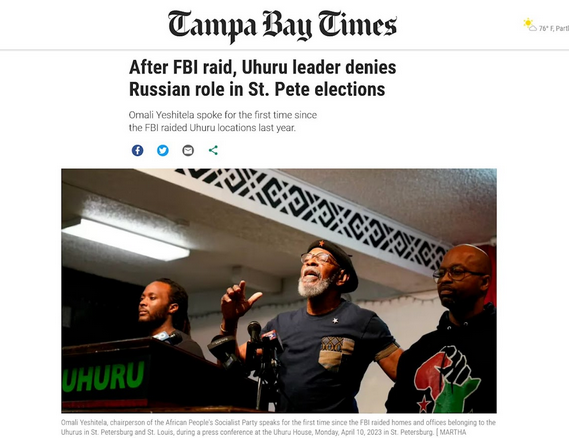“Come out with your hands up,” boomed a voice from a mobile intercom on Jul. 26, 2022. This according to longtime Uhuru Movement leader and Black rights advocate Omali Yeshitela, who at the time was sitting across the dinner table with his wife, Ona Zené Yeshitela, at their home in St. Louis. Deafening explosions from flashbang grenades began as the 81-year-old Yeshitela descended his staircase onto the first floor, with lights beaming through the windows. A drone flew through the residence, nearly striking the head of his wife as laser-pointed dots scanned his chest. There were armored vehicles, and camo-clad government agents aimed assault weapons at him. Yeshitela and his wife were then handcuffed and zip-tied outside while FBI-affiliated personnel raided their home, allegedly refusing to produce a warrant when requested by Yeshitela at the scene and carrying out boxes of documents for hours.
The FBI simultaneously raided the office of the African People’s Solidarity Committee in St. Petersburg, using a battering ram to break into the building and seize organizational records and communication devices at gunpoint. On Apr. 18, 2023, the Department of Justice (DOJ) indicted Yeshitela and three other U.S. citizens for “sowing discord” and thus interfering in St. Petersburg elections through “agitprop.”
“They declared that despite the fact that I have been involved in fighting this system for most of the 81 years that I have been alive,” Yeshitela said, energetically addressing a crowd after the indictment was issued at the Fund People’s Needs, Not the War Machine rally held in Washington on Mar. 18. “Despite the fact that I have opposed every predatory war which the United States—which by the way is the strategic enemy of all of humanity—despite the fact that I have always done that, they have declared that Black people [are] so stupid that it takes Russians to tell us that we are oppressed.”
The DOJ accused the Black socialist of conspiring with a Russian citizen they claim directed Yeshitela and others to spread disinformation favorable to the Russian government. The DOJ did not actually file charges at the time of the raid, instead calling Yeshitela and the other African People’s Socialist Party (APSP) members targeted “unindicted co-conspirators.”
Yeshitela has had a long history of subversive activism advocating for Black rights in St. Petersburg. Originally named Joseph Waller Jr, he changed his name to Omali Yeshitela when he founded the Uhuru Movement in 1972. Uhuru means “freedom” in Swahili. As a young man living in St. Petersburg, he grew up during the era of Jim Crow when Black people were barred from bathing at most beaches and segregated from white people.
By 1966, he was the 25-year-old vice chairman of the local chapter of the Student Nonviolent Coordinating Committee (SNCC) and was planning demonstrations to delegitimize the formal and symbolic system of white dominance that pervaded St. Petersburg during the Civil Rights Movement.
His most iconic subversive action was when he removed a mural that hung from the wall of St. Petersburg City hall, a mural that included a cartoonish and racist depiction of a group of Black caricatures playing music titled “Picnicking at Pass-A-Grille,” which the city refused to remove.

Believing the mural represented a relationship between local power centers and racist structures oppressing Black people in town, Yeshitela set out to gain a strategic victory by making a media splash protesting the mural. On Dec. 29, 1966, protesters arrived at the steps of City Hall, making a commotion to attract the attention of the press.
When an elderly black woman joined the march and addressed the crowd using nonstandard grammar to complain about insurance fraud in the Black community, the white crowd and some members of the press began to laugh.
Outraged at the insensitivity and craving a direct repudiation for the injustice experienced by Black citizens in town, Yeshitela stormed into City Hall and tore the mural from the wall. This action brought the ire of local authorities and conservative members of the Black community who sought to make an example of him to discourage other African Americans hungry for change from doing the same.

“Although his militant posture attracted the attention of White city leaders,” wrote University of South Florida-St. Petersburg honors student Anita Cutting in her retelling of the events. “They were confident that they, and the black moderates, could control Waller and his small band of radical followers, thereby posing no real threat to the status quo. That changed when he tore down the mural.”
After tearing down the mural, Yeshitela served five years in prison, targeted by establishment leaders for the offense. This ignited a lifelong career in activism for Yeshitela, who has been fighting for the rights of Black people ever since. He has maintained his unyielding and incontrovertible spirit, often advocating for controversial policies that continue to draw the ire of establishment power, such as reparations for Black people and Black Nationalism.
According to statements made by Yeshitela reported to the St. Louis Post-Dispatch, Yeshitela later moved to St. Louis from St. Petersburg after feeling inspired by the protest movement that arose in the area after the police killing of Michael Brown. He continued to work in the Black community there, rebuilding properties, opening a community garden, and fielded two candidates for the Board of Aldermen who unsuccessfully ran with reparations at the top of their platforms.
The case that initially served as the basis for the July raid of Yeshitela’s St. Louis home was an investigation of Aleksandr Viktorovich Ionov, president of the private organization Anti-Globalization Movement of Russia (AGMR), which receives grants from the Russian government. The DOJ accused Ionav of having contact with agents of the Russian government’s intelligence agency, the Federal Security Service (abbreviated FSB in English), without filing documents notifying U.S. officials first.
According to the indictment issued in July, Ionav told Russian officials in written communication that he had several “partnerships” and “directed” key leaders of U.S. based groups by providing them with articles and information that cast Russia in a positive light. This was the justification provided by the DOJ for implicating the Uhuru Movement and APSP and charging Yeshitela and three St. Petersburg residents with conducting an intentional conspiracy to interfere in U.S. elections. The individuals named were APSP leaders Penny Joanne Hess, Jesse Nevel and Augustus “Gazi Kodzo” C. Romain Jr.

The DOJ alleges that the Uhuru leaders were aware that Ionav acted to influence them at the behest of Russian intelligence, and further, that the Uhuru Movement acted to disrupt U.S. elections held in St. Petersburg by supporting candidates while in contact with Ionav. The primary candidate in question is Jesse Nevel, who ran for mayor of St. Petersburg with the endorsement of the Uhuru Movement in 2017 and garnered 2 percent of the vote.

As evidence of the Uhuru connection to Russian intelligence, the DOJ alleges that Yeshitela and others had their travel expenses paid several times to attend meetings and conferences in Russia at the invitation of AGMR.
“Yes, I have been to Russia, but I’ve also been to South Africa, I’ve been to Ghana, I’ve been to various other places in Africa, I’ve been to Nicaragua,” Yeshitela told St. Louis Public Radio in response last year. “I’ve been to all kinds of places where oppressed people are organizing because Black people need not to be isolated.”
As per rights guaranteed by the First Amendment, it is not illegal to hold and express views critical of the United States, even views favorable to a foreign power. The justification the DOJ has used to prosecute the case hinges on the technicality that the APSP failed to fill out a document declaring themselves to U.S. officials as Russian agents while St. Petersburg candidates received endorsements from the Uhuru Movement.
Some anti-war voices, free speech advocates and socialists are fearful that this prosecution could set a loose precedent for charging citizens with “sowing discord,” a precedent which they say could then be wielded by state authorities to target other dissidents.
For the defendants, the potential consequences of a successful prosecution are immediate and dire. Yeshitela, Nevel and Hess face up to 10 years in prison on these charges. All other members indicted face a maximum sentence of up to five years.
It’s worth noting the uneasy history Black Nationalists and the FBI have shared through the years. For example, in 1967, the FBI launched a domestic spying and infiltration campaign against prominent civil rights leaders called COINTELPRO. According to internal memos leaked after an FBI office was raided by activists, at that time the FBI earnestly and actively sought to “discredit, disrupt and destroy” Black rights organizations and the Civil Rights Movement.
Yeshitela unilaterally denies the accusations made by the FBI and DOJ.
“If you remember, in 1969 the FBI declared that the Black Panther Party [was] the greatest threat to the internal security of the United States,” Yeshitela told Democracy Now. “And it was an organization dealing in international affairs, and it didn’t have the kind of organizational presence that we have throughout the African world. So that’s why we came under attack.
“They’ve stolen… laptops and cellphones and other devices like that, but they took a lot more,” Yeshitela continued. “They took years and years of communication with various people that we’ve had around the world and throughout this country. They’re constructing some narrative that will defend what it is they’ve done”
He concluded, “It’s a ridiculous charge. George Floyd didn’t happen; it wasn’t the murder of Mike Brown that brought the APSP into Ferguson and St. Louis; that somehow the Russians had something to do with it—it’s asinine. And anybody can see our history.”
Yeshitela told NPR that he is “looking forward to [his] day in court,” seemingly confident that the case will be defeated. If it isn’t, he will potentially face dying in prison for sowing discord after a lifetime of advocating Black rights.

